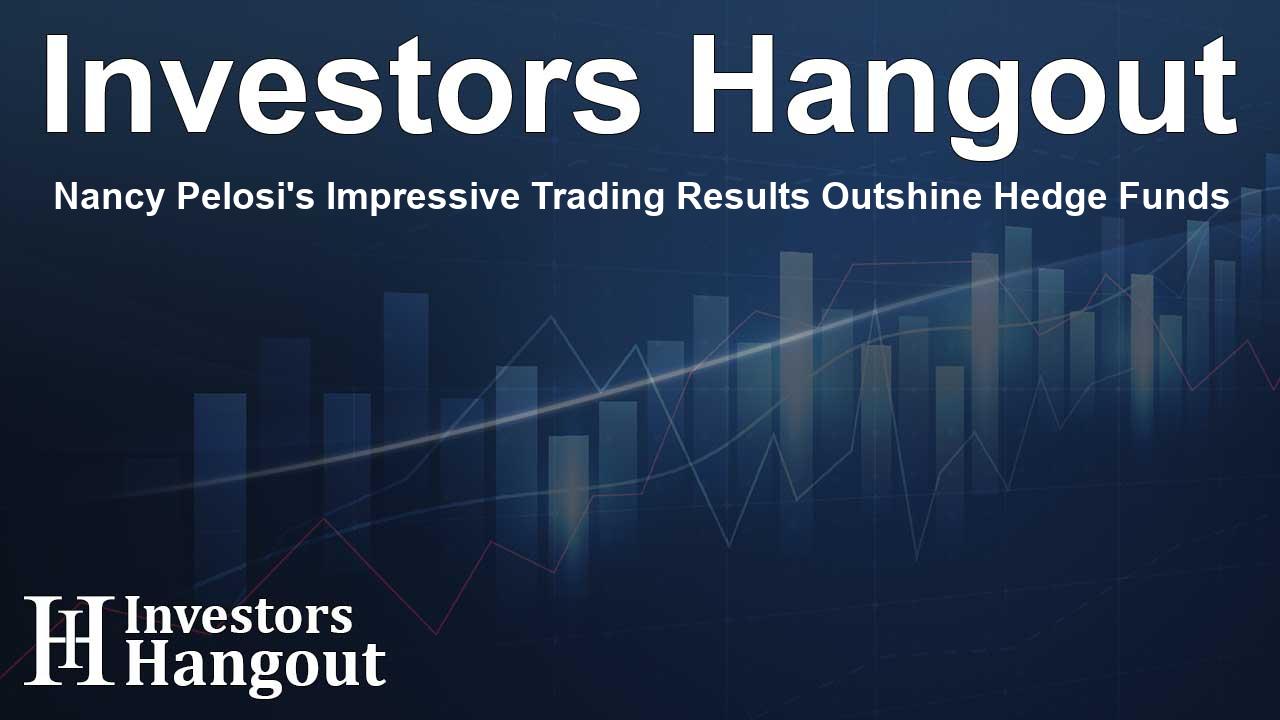Nancy Pelosi's Impressive Trading Results Outshine Hedge Funds

Nancy Pelosi's Significant Market Impact
Nancy Pelosi's stock tracking performance in 2024 has created quite a buzz in financial circles. This year, she achieved a staggering 54% gain, positioning her ahead of nearly every hedge fund. This outcome is astonishing, especially as it surpassed even the notable Inverse Cramer Stock Tracker, which posted an impressive 43% gain.
The Allure of Political Trading
The transformational effect of trading performance tied to political figures is a fascinating phenomenon. Pelosi's exceptional results have garnered various reactions and sparked a broader interest in the trading patterns of lawmakers. This fascination primarily stems from the information disclosures required under the STOCK Act, which mandates transparency in stock trades made by members of Congress.
The STOCK Act and Its Impact
This legislation, enacted in 2012, aimed to address concerns surrounding insider trading and illuminate lawmakers' financial activities. Despite ongoing debates about its effectiveness, the act has contributed to a rise in interest for investment strategies inspired by political decisions. Traders are increasingly leaning into congressional trading insights.
The Performance of Hedge Funds
While hedge funds typically focus on stable guidance and minimizing risks, their average returns in 2024 fell short compared to Pelosi's remarkable stock performance. Reports suggest hedge funds averaged just a 10.7% return this year. A few hedge funds did excel, but most struggled to achieve significant gains.
A Closer Look at Hedge Fund Performance
Among the hedge funds, Light Street Capital is a notable outlier with a remarkable return of 59.4%, exceeding Pelosi's gains. Other hedge funds, such as Discovery Capital and D.E. Shaw – Oculus, showed decent but lesser performances at 52% and 36.1%, respectively. However, firms like Citadel Wellington and Millennium Management managed only modest gains.
The Rise of Political Trading Strategies
The visibility of lawmakers’ trades has ignited a new trend in political trading strategies. With platforms like Unusual Whales gaining traction, investors are turning to tools that mimic the trading behaviors of politicians. Since the pandemic, the interest in these strategies has surged dramatically, with many investors eager to capitalize on congressional trading patterns.
The Promise and Pitfalls of Political Trading
While some argue that this emerging trend provides opportunities for investors, critics have raised concerns regarding the ethical implications of such practices. The rapid rise of political trading mechanisms, while legal, has sparked debates on the transparency and accountability of lawmakers' trading strategies.
Calls for Legislative Reforms
As the conversation around political trading grows, calls for reform are intensifying. Advocates for change highlight the potential benefits of stricter regulations, such as allowing only same-day disclosures for legislative stock trades. Such measures could reinforce accountability among lawmakers and bolster public trust.
Implications of Reforms
While the current system facilitates trading insights, enhancing regulatory measures could also prove beneficial in restoring confidence in public representatives. Tools like the Pelosi Tracker draw attention to these critical issues and underscore the need for ongoing discussions about legislative ethics.
Frequently Asked Questions
What is the STOCK Act?
The STOCK Act is a law requiring members of Congress to disclose their stock trades publicly to enhance transparency and combat insider trading.
How did Pelosi's stock performance compare to hedge funds?
Pelosi achieved an impressive 54% gain, while hedge funds, on average, saw returns of 10.7%, showing her strategies significantly outperformed most funds.
What are political trading strategies?
Political trading strategies involve investing based on disclosures and trading patterns of lawmakers, inspired by the transparency requirements of the STOCK Act.
Are lawmakers allowed to trade stocks?
Yes, lawmakers can trade stocks, but they must disclose trades exceeding $1,000 within a set timeframe as mandated by the STOCK Act.
What are some suggested reforms for congressional trading?
Proposed reforms include enacting stricter laws on trading by lawmakers and their families, such as banning individual stock trades entirely.
About Investors Hangout
Investors Hangout is a leading online stock forum for financial discussion and learning, offering a wide range of free tools and resources. It draws in traders of all levels, who exchange market knowledge, investigate trading tactics, and keep an eye on industry developments in real time. Featuring financial articles, stock message boards, quotes, charts, company profiles, and live news updates. Through cooperative learning and a wealth of informational resources, it helps users from novices creating their first portfolios to experts honing their techniques. Join Investors Hangout today: https://investorshangout.com/
Disclaimer: The content of this article is solely for general informational purposes only; it does not represent legal, financial, or investment advice. Investors Hangout does not offer financial advice; the author is not a licensed financial advisor. Consult a qualified advisor before making any financial or investment decisions based on this article. The author's interpretation of publicly available data presented here; as a result, they should not be taken as advice to purchase, sell, or hold any securities mentioned or any other investments. If any of the material offered here is inaccurate, please contact us for corrections.